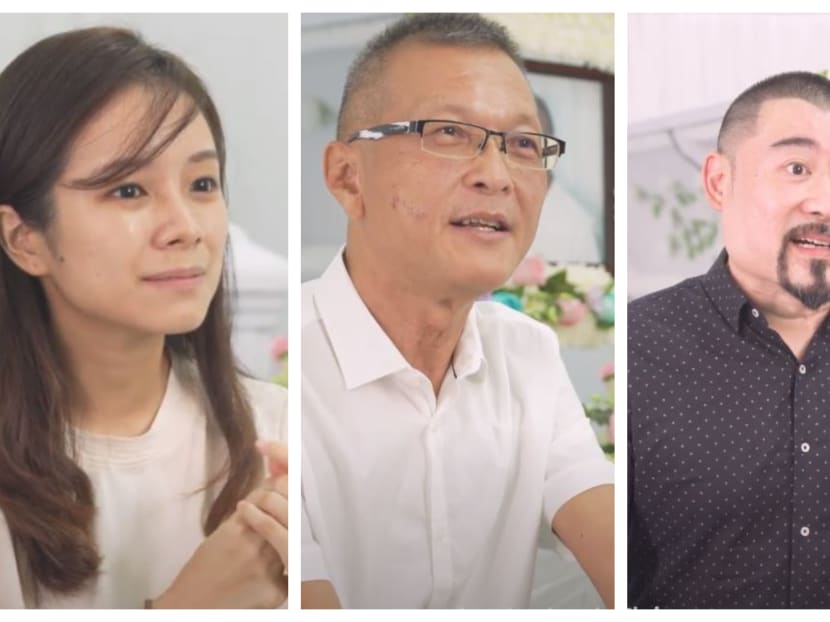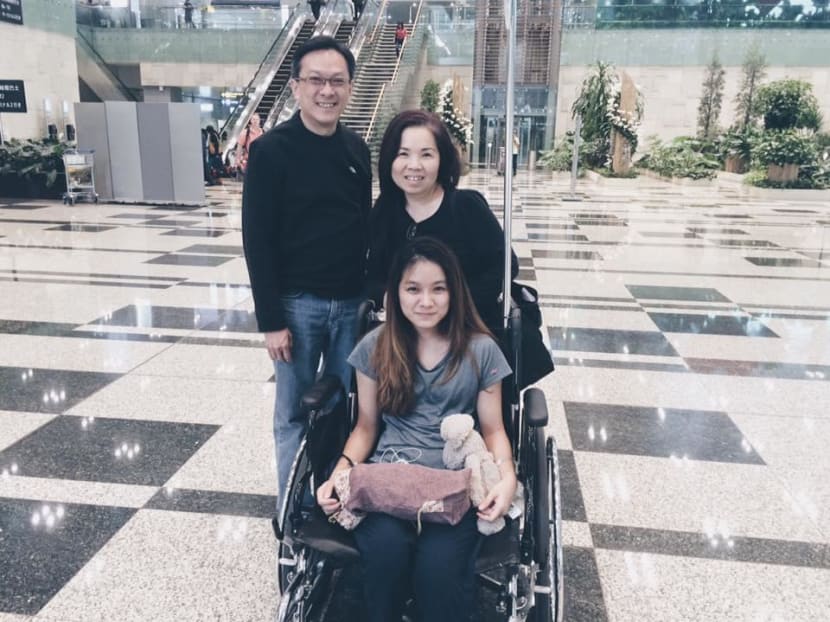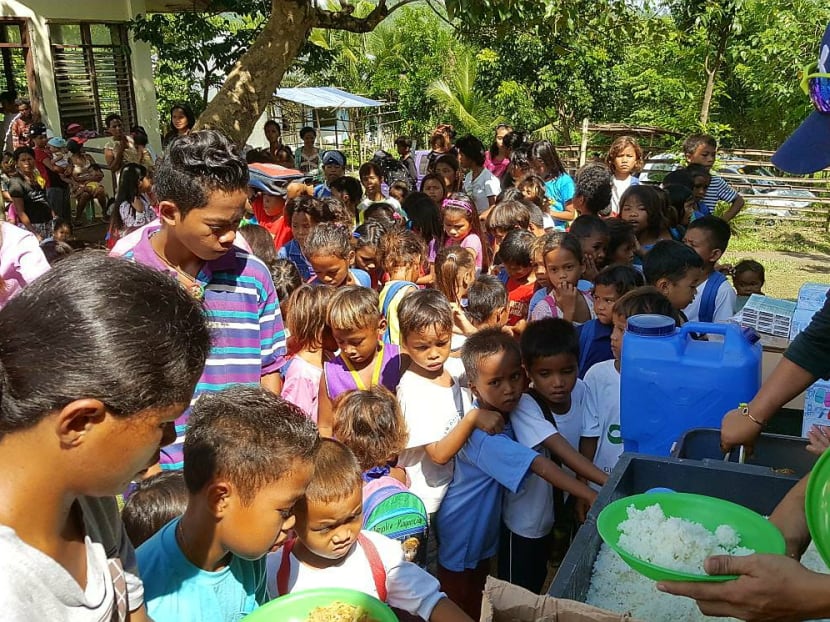Near-death encounters spur Singaporeans to help those in need
SINGAPORE — It was meant to be an adrenaline-filled holiday for five Singaporean friends rock-climbing at the Grampians National Park in Victoria, Australia.

Ms Rachel Ch'ng, Mr David Ong and Mr Jason Ong (from left to right) said their near-death encounters spurred them to leave behind a positive legacy.
- A funeral firm has started a video campaign to spark conversations on how people can live a purposeful life
- The videos feature Singaporeans who have had close brushes with death reflecting on their own “mock funerals”
- Three participants told TODAY their near-death encounters have spurred them to leave behind a positive legacy
SINGAPORE — It was meant to be an adrenaline-filled holiday for five Singaporean friends rock-climbing at the Grampians National Park in Victoria, Australia.
But their vacation in 2016 took a drastic turn when the vehicle that Ms Rachel Ch’ng was travelling in collided with another, and left her fighting for her life.
The impact was so severe that it sent Ms Ch’ng, then 24, out of the vehicle, and put her in a week-long coma.
She was left with multiple injuries, including fractures on her ribs and pelvis, punctured lungs, a seriously damaged spleen and broken legs.
Ms Ch’ng’s friends also suffered injuries of varying degrees.
The accident also affected her memory. When Ms Ch’ng awoke from her coma, she could not remember her age or where she was. Even simple acts such as sitting upright, coughing or laughing became a challenge.
“When I drank a sip of water, I would be choking uncontrollably for a few minutes. I was in overwhelming pain… The fear of death was gripping,” the civil servant, who is still undergoing physiotherapy four years after the crash, told TODAY last month.
Ms Ch’ng is among seven Singaporeans who are part of a video campaign put together by funeral firm Harmony Funeral Care. It aims to spark public conversations about how to live a purposeful life, as though tomorrow might be their last.
The first of two videos, published on Friday (Jan 1), features Singaporeans who have faced close brushes with death taking part in a “mock funeral” and reflecting on it.
THE KINDNESS OF STRANGERS
While coping with the aftermath of the accident plunged Ms Ch’ng to a nadir, she found strength through the support of her family, friends and even strangers.
She said that random acts of kindness from strangers during her four months in an Australian hospital spurred her to similarly be kind to others in Singapore.
Two incidents stood out.
The first was when her mother, who flew to Australia after the accident, pushed her past a florist while she was in a wheelchair. Ms Ch’ng recalled feeling “very down” until a stranger saw her and bought her a bouquet of tulips.
In another encounter, Ms Ch’ng had to walk to a physiotherapy clinic by herself while she was still on crutches. A fellow patient noticed her struggles and offered to go with her.
“It really moved me to be shown kindness from complete strangers,” said Ms Ch’ng.
It made her think about the difficulties that people with disabilities might face that able-bodied individuals take for granted.

Ms Rachel Ch'ng with her parents upon her return to Singapore in 2016 after a harrowing traffic accident in Australia. Photo courtesy of Rachel Ch'ng
These days, Ms Ch’ng finds ways to help the less fortunate back home. During her spare time, she volunteers with an organisation for the visually impaired in Singapore.
One of her contributions is a mobile application she built from scratch, even though she had little experience developing one — she relied on how-to videos.
The free app, Mr Sight, helps visually impaired users identify items captured by a phone camera through an audible announcement. She also created another free app called Learning Braille, which aims to teach people the tactile writing system used by those who are visually impaired.
Ultimately, Ms Ch’ng hopes to look beyond the “smallness” of her own world to consider the well-being of others: “We're all just trying to make sense of this short but very precious life, and figuring out how we can live meaningfully and joyfully.”
ILLNESS FORCED HIM TO SLOW DOWN
Ms Ch’ng is not the only one whose ordeal has spawned hopes of leaving behind a positive legacy in society.
When itinerant pastor David Ong was diagnosed in 2004 with multiple myeloma, an incurable cancer of the plasma cells, his whole world came crashing down.
Mr Ong, 60, recalled crying a lot and thinking of his family and the “death sentence” he had been handed. It did not help that the side-effects of chemotherapy left him exhausted.
Yet the solace he sought from his loved ones and his religion allowed him to come to terms with his illness.
“I told myself there is a season for everything: A season to run and a season to rest,” said Mr Ong, adding that his illness forced him to slow down and take stock of his life.
Eventually, he found a new calling — to give comfort and encouragement to those facing their own mortality.
The patients he has helped appreciated that he could not only empathise with them but bring them comfort along the “dark and deep valley” of terminal illness that he himself experienced, he said.
“Just being there alongside (the terminally ill) and being their friend, that to me is very fulfilling,” said Mr Ong, whose cancer has since gone into remission.
HELPING UNDERPRIVILEGED CHILDREN
Mr Jason Ong, 48, was similarly forced to confront his mortality when he was diagnosed with an endolymphatic sac tumor, a rare form of brain tumour, in 2004.
His doctors told him that he had only six months to live.
Racing against time, he wanted to make every moment count by feeding children living in poverty in the Philippines and Indonesia.
To fund this, Mr Ong and his wife started Olive Vine restaurant in 2007, so that a portion of its proceeds could be channelled regularly into buying necessities for the children.
The restaurateur outlived his doctors’ prognosis, although he was told there is still a high chance of a relapse.
While the Covid-19 pandemic has prevented the husband-and-wife team from visiting the underprivileged children abroad, they continue to oversee the operations from Singapore.
“We spend a lot of time chasing our dreams and ambitions, and while there is nothing wrong with that, I want to humbly recommend… that we also live not just for ourselves but also those less fortunate,” Mr Ong said.

Children from a village in Davao, the Philippines, are seen in 2012 waiting to collect food bought with the proceeds from Olive Vine restaurant. Photo courtesy of Jason Ong
Ms Harmony Tee, founder of Harmony Funeral Care, which is behind the video series, said that being in the funeral trade for more than three years has made her appreciate the fragility of life.
“You come (to this life) empty-handed and you leave empty-handed. At the end of the day, what you really leave behind is the impact… and influence you have towards others when you are no longer around.”








